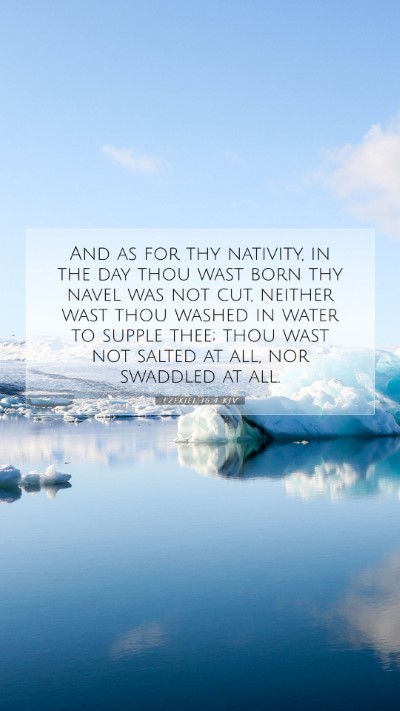Understanding Ezekiel 16:4
Ezekiel 16:4 is a powerful verse that encapsulates the themes of rejection and divine mercy, illustrating how God’s relationship with His people is often reflective of the most profound love story.
Bible Verse Meaning
This verse provides an insight into the early state of Jerusalem, depicted as a newborn left to die. It emphasizes the notion of being unprepared, vulnerable, and utterly dependent. The verse states:
“And as for your birth, on the day you were born, your cord was not cut, nor were you washed in water to cleanse you; you were not rubbed with salt or wrapped in swaddling cloths.”
Bible Verse Interpretations
In this passage, we see God presenting Israel's inception, highlighting both physical neglect and spiritual abandonment. Here are some key interpretations:
- Birth without care: The imagery of an abandoned child denotes Israel’s helpless situation and God’s gracious intervention.
- Lack of nurturing: The absence of care signifies the lack of human support and care; it metaphorically represents Israel's estrangement from God.
- Divine Intervention: While the circumstances reflect neglect, it emphasizes God's role as the caring protector who later intervenes.
Bible Verse Understanding
To fully understand Ezekiel 16:4, we must delve into its historical and theological context. The verse speaks directly to the people of Jerusalem:
- Historical Context: Ezekiel prophesied during the Babylonian exile, a time when Israel felt forsaken and abandoned.
- Theological Significance: This reflects Israel's utter dependence on God for survival and identity. It sets the stage for God's redemptive plans for His people.
- Relationship Dynamics: The expounded neglect in childbirth signifies the emotional and spiritual vacuum that Israel faced.
Bible Verse Explanations
Matthew Henry's Commentary: Henry emphasizes the depth of God's mercy and love towards Israel, highlighting how God treated them with compassion even when they were in a state of despair.
Albert Barnes' Notes: Barnes points out the importance of the imagery used, insisting that it is not merely a statement about birth but a striking metaphor for the beginnings of a unique relationship.
Adam Clarke's Commentary: Clarke notes that the description serves to illustrate the idea of grace; that despite the circumstances of their birth, God is always willing to extend His hand for healing and restoration.
Application of Ezekiel 16:4
In applying this verse to daily life, individuals can draw parallels between their own experiences of neglect and longing for support. Here are some reflective points:
- Recognize moments when you felt abandoned and how those times compelled you to seek God's presence.
- Consider how God’s redemptive actions in your past have influenced your current spiritual journey.
- Understand the importance of nurturing relationships within a faith community; as God cared for Israel, we are called to care for one another.
Related Bible Cross References
- Ezekiel 16:6 - The Lord's compassion noted in the subsequent verses.
- Isaiah 49:15 - God’s comforting words about His people’s welfare.
- Deuteronomy 7:7-8 - God's choice of Israel not because of their status but out of His love.
Final Thoughts
In exploring Ezekiel 16:4, readers are invited to engage deeply with the Bible verse meanings, interpretations, and explanations, fostering a greater understanding of Scripture. This process enriches personal faith and enhances group discussions in bible study groups or online bible study settings. Such insights yield profound implications for applying biblical principles to everyday life.


